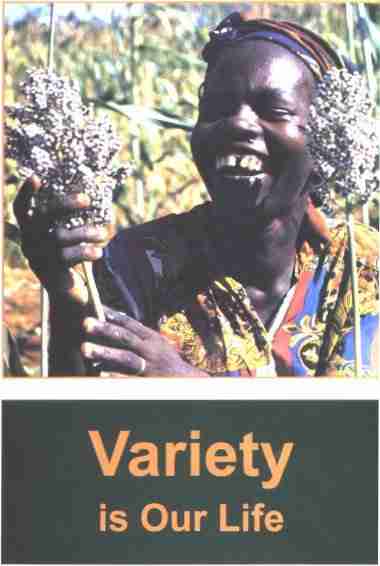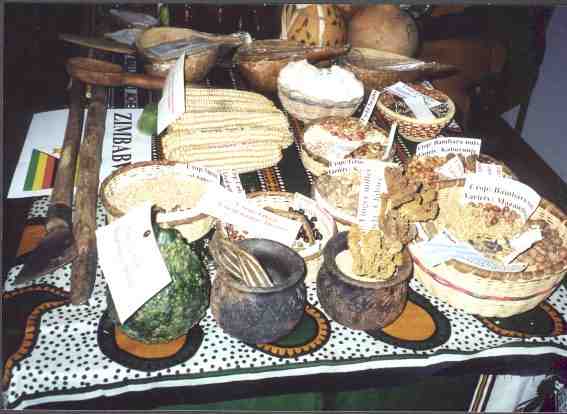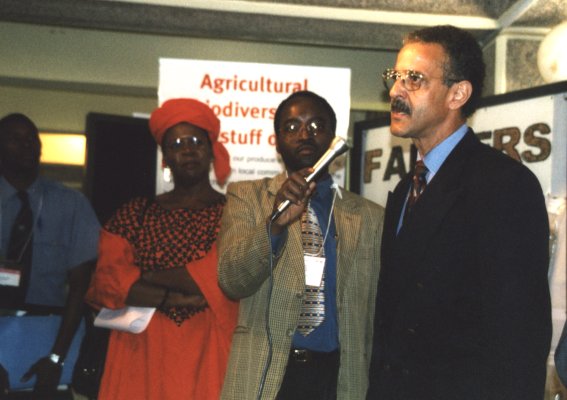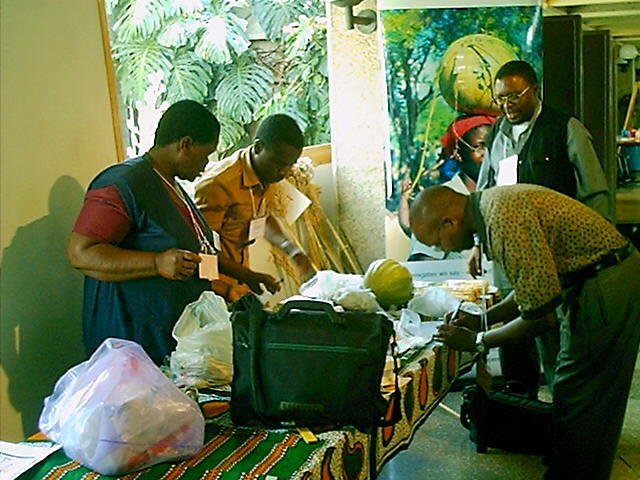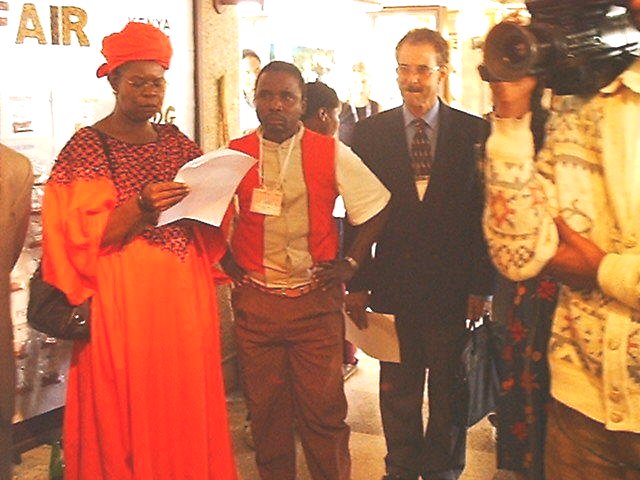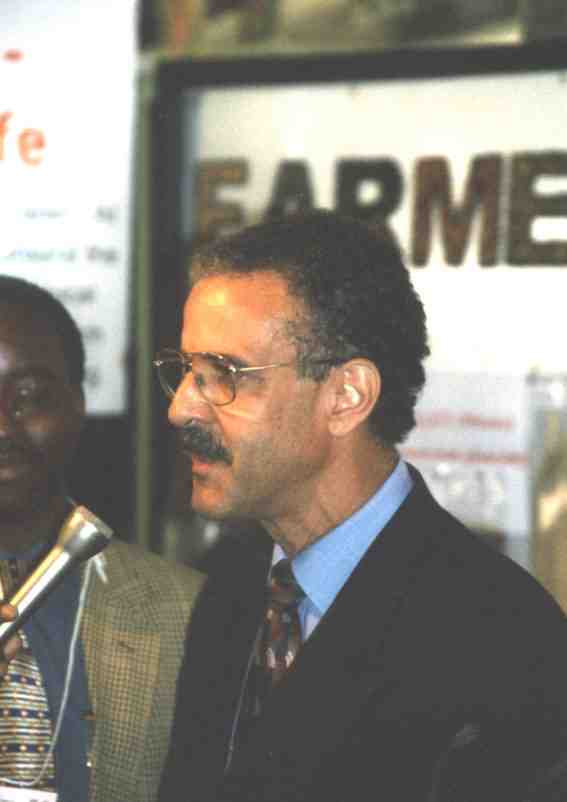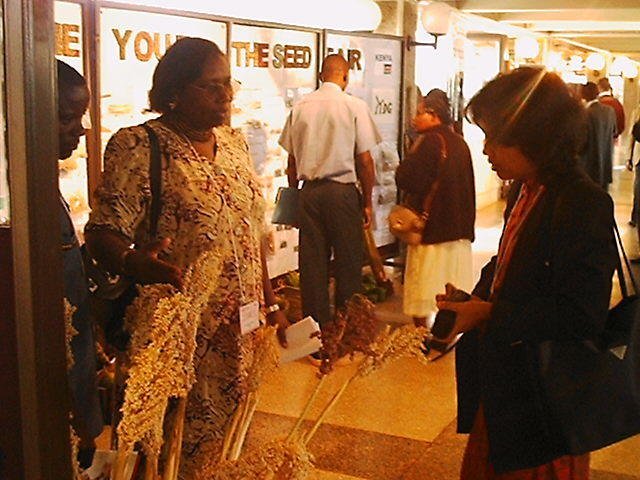|
|
|
FARMERS' SEED FAIR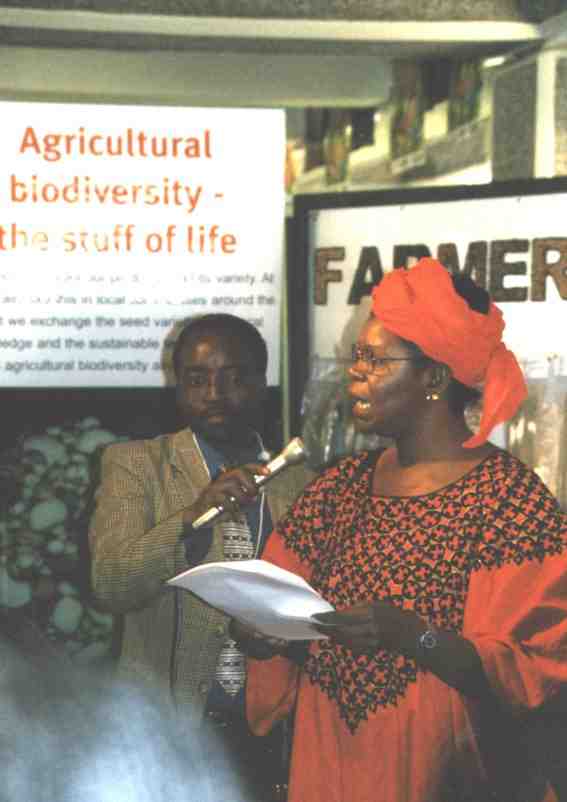 Ambassador Mary Odinga officially opens Farmers' Seed FairFarmer's Seed Bank Project Enhances BiodiversityBy Wandera Ojanji, ELCI It was an amazing display of seed (crop) diversity. The Seed Fair at the UNEP lobby organized by ITDG, saw farmers display seeds that many had forgotten, many had never known, ever existed. It was by and large a case of farmers’ success in agricultural biodiversity management, utilization and conservation.
But how have they managed to conserve such diversity in times when many species are disappearing, especially in a dryland ecosystem, like Tharaka in Eastern Kenya, where it is very fragile? Through the assistance and training from ITDG, the farmers formed the Gakia Seed Conservation Group. Through collective effort and information sharing, the group has looked for seeds or crop varieties that used to do well in the area but have disappeared. The success of the group has been overwhelming as evidenced at the exhibition. In 1997, when the group was formed, the group identified and collected 15 seed or crop varieties. Just three years down the line, they have collected over 40 varieties that had disappeared. To ensure the sustainability of their project, they have formed a community seed bank from where farmers can easily access the various seed varieties. The group even distributes to non-members as a way of further diversification on various farms. Because of the initiative, they now have about 50 varieties of sorghum and over 29 varieties of millet, growing in Tharaka. Amina Njeru, who has been one of the group members and a beneficiary of the initiative now boasts of having, eight varieties of millet, seven varieties of cowpeas, four varieties of green grams, among other crop varieties. She says her greatest achievement was the acquisition of mugoi, and Mututwa, millet varieties that had disappeared long time ago when she was still a child. Mugoi is very sweet while Mututwa is very good for beer making. Even in her later 40’s, and the bias towards modern foods or lifestyle fond memories of her favorite millet and the associated products still lingers on. And she wasn’t the only one with whom the Fair aroused fond memories of the past. The seed and vegetable varieties also touched the Kenyan Ambassador to Japan, Her Excellency Mary Odinga, on display.
She said, “I look with nostalgia to the past when I recall how I used to see granaries of my grandparents filled to capacity with all manner of healthy foods harvested from the same farm that today produces sickly harvest of beans and maize.” In fact, Amina Njeru, while acknowledging the contribution of biotechnology in agricultural diversity, says farmers’ ignorance has played a big role in crop failures of some of the introduced varieties, her being one of the victims. However, they have vast knowledge on crop husbandry of their indigenous crops, something that has ensured no crop failures. For instance, having been impressed by the performance of Pioneer and Kagil maize varieties, she adopted the varieties on her farm. However, unaware that the varieties cannot be replanted, she went ahead and used the seed from the harvest for the next planting. It was disaster. She only managed to get very healthy leafy vegetation, but no grain. She is indeed very grateful to ITDG for the education and training they are providing, saying that it has not only assisted them in diversification of agricultural crops but has also helped them attain some level of food sufficiency.
OPENING CEREMONY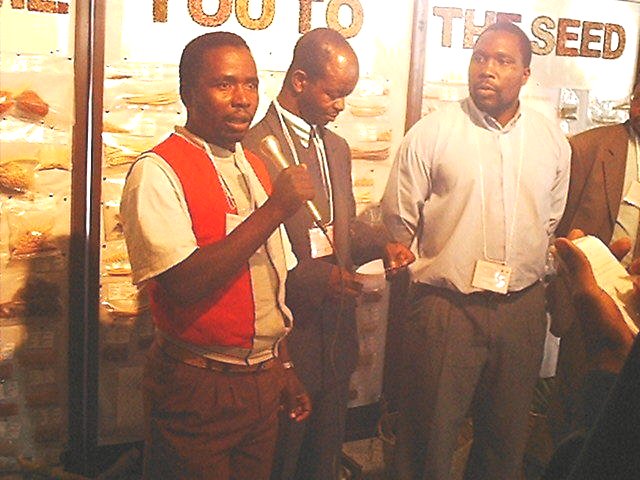 Mishek Mutapwa from Zimbabwe welcomes Delegates, accompanied by ITDG East Africa Director, Elijah Agevi, and ITDG Zimbabwe Agriculture Programme Director, Blessing ButaumochoFarmers invite Delegates to their Seed FairMonday, more than 25 farmers from Ethiopia, Kenya, Uganda and Zimbabwe
showed Delegates their seeds and sent a strong message to the COP… Their words were listened to by a crowd of people and guests of honor Ambassador Mary Odinga and the Deputy Director of UNEP, Jorge Illueca.
Over 100 varieties of seeds were on display representing the collections of several communities. Special characteristics were discussed by the knowledgeable guardians of diversity – the farmers. Delegates were invited to listen to their stories. 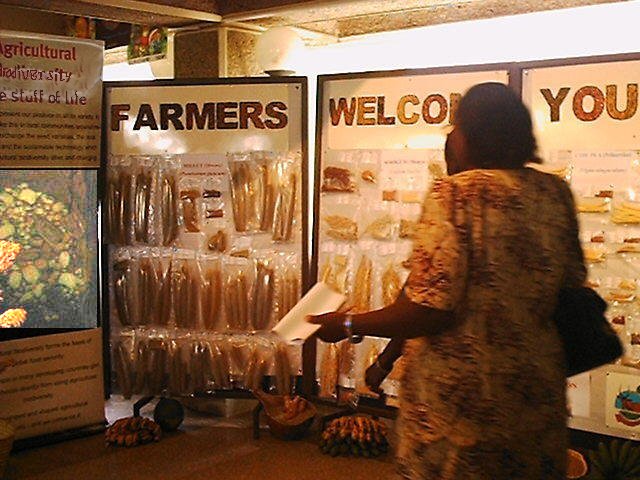 Seed DisplayAs Amina Njeru, a woman farmer from Tharaka Kenya said: “COP should ensure continuity of farmers’ guardian role for a major part of global biodiversity”.
Ambassador Odinga and the UNEP Deputy Director, Jorge Illueca, echoed these sentiments and supported the call for farmer-centred programmes, especially on agricultural biodiversity and drylands. 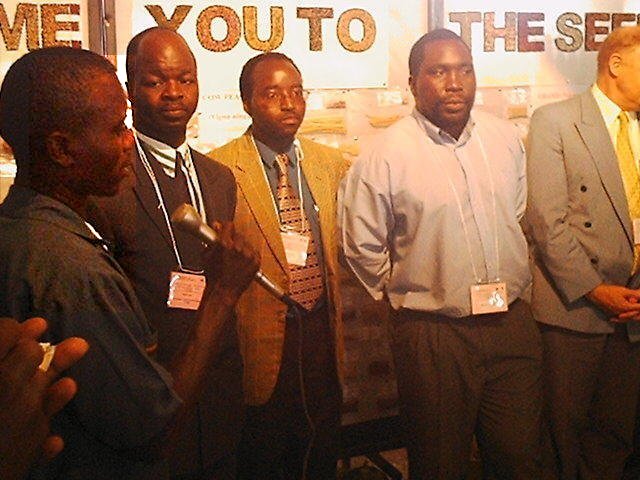 Simon Mwingi, Tharakan Farmer opens Seed FairThis recommendation had been made by the farmers at GBF 15 workshop on Agricultural Biodiversity: “The two Programmes of Work on Agricultural Biodiversity and Dry and Sub-Humid Lands must be centred on farmers, including pastoralists, fisherfolk and hunter gatherers. The Convention and its Parties should give full support to actions by farmers that conserve and sustainably use / maintain agricultural biodiversity and reflect such actions in their National Reports.” 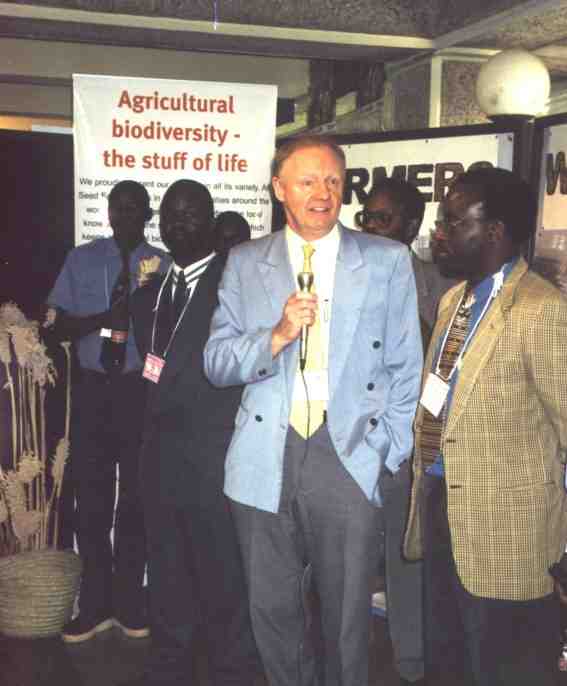 Patrick Mulvany, ITDG Food Security Policy Adviser, emphasizes importance of listening to farmers' views
SEED DISPLAYS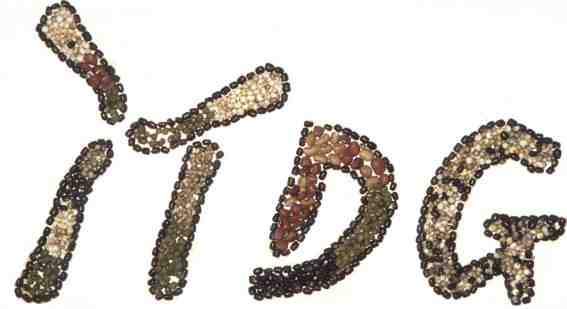 ITDG supports farmers' seed fairThe Seed Fair was on display in the Upper Lobby of UNEP for the whole of the week 15 - 19 May 2000. 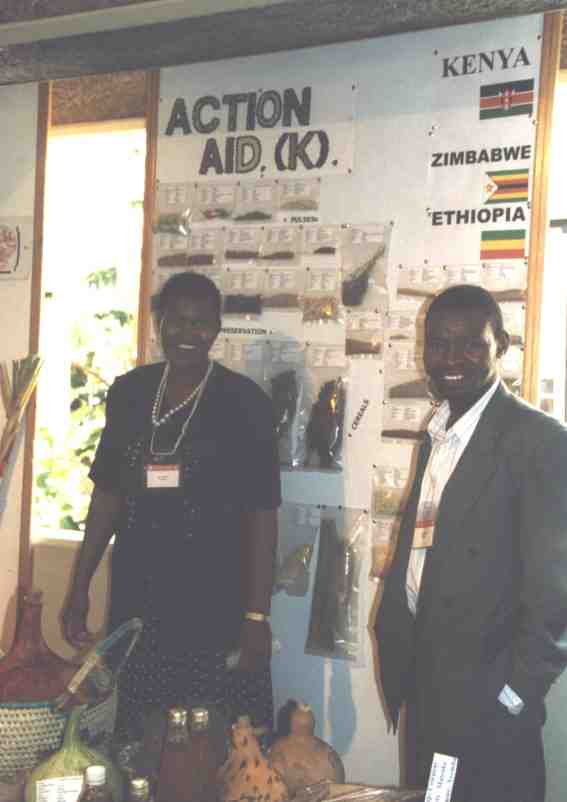 Display of Farmers working with Action Aid Kenya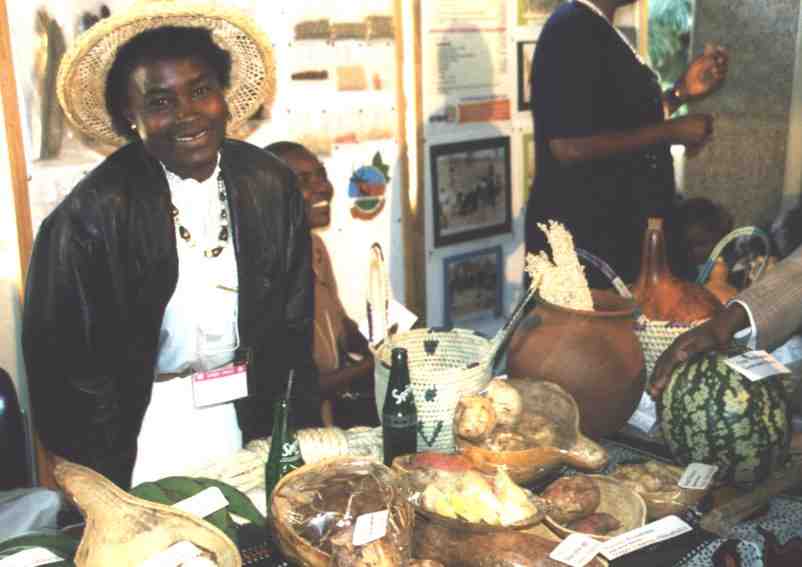 Action Aid seed display
ActionAid Ethiopia in solidarity with Kenyan farmers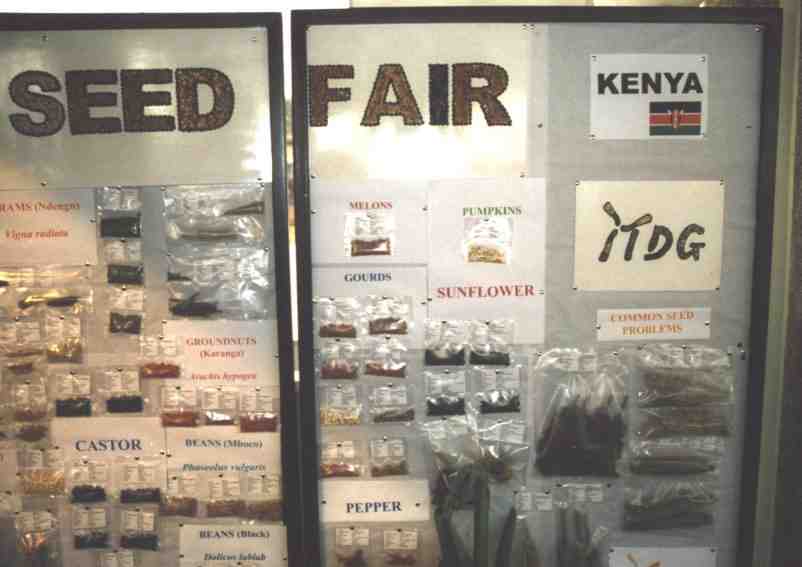 Display of farmers from Tharaka, Kenya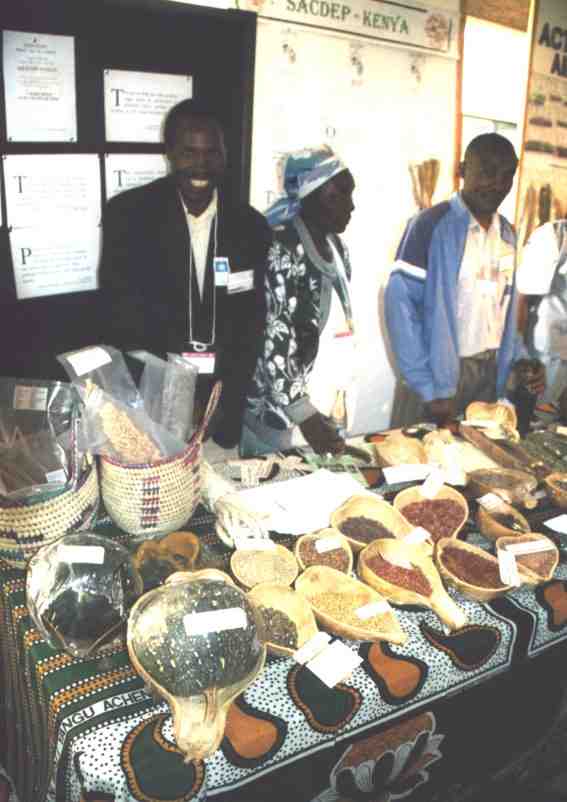 Display of farmers working with SACDEP, KenyaQUOTES FROM FARMERS & SACDEP, KENYA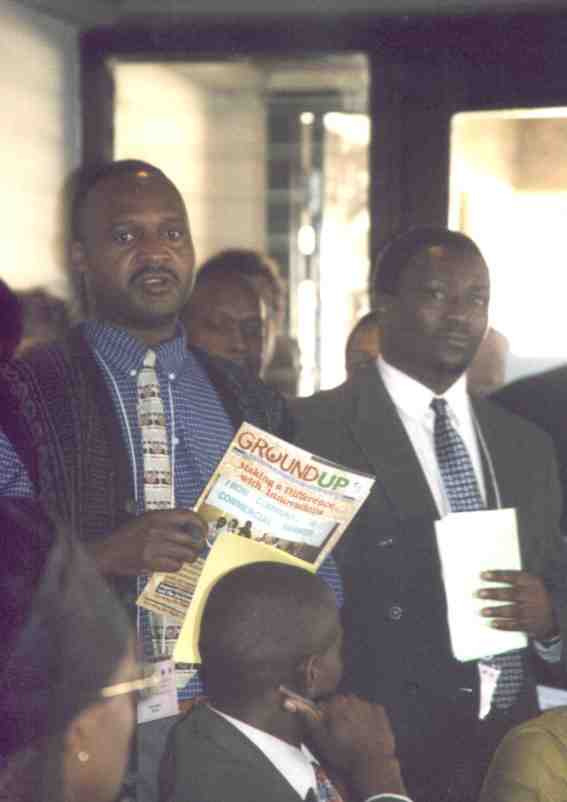 Ngugi Mutura, SACDEP Manager attends PELUM Journal launch"The Main aim of an agricultural research project should e to improve existing indigenous technologies to intensify food production among smallholder farmers" Ngugi Mutura, SACDEP Manager "People are the foundation of the earth. If the foundation is firm then the world will enjoy tranquillity. But 3/4 of the world's people are poor. In other words, 3/4 of the world's population is weak. As long as this continues to be true, we have a very poor foundation upon which to build the world... ...and to eradicate poverty we must support farmers to maintain biodiversity" Zachary Makanya SACDEP "We may not be able to explain with mere words about the importance of preserving our many plants. Our very existence hinges on it. We must maintain our plants for our existence and the survival of future generations." Peter Kihato, Kakuzi farmer "The researchers should give us a feedback after every research project. They should explain to us the research findings and how the findings can help small-scale farmers" Eddah Nyambura Eldoret farmer "A soccer match has many players. All players recognize one another. We are key stakeholders in food production. Why are our rights not recognized?" Agnes Mwatu Yatta farmer "Farmers opinion should be sought before initiating research projects. Currently most researchers are top down." Zacahary Makanya SACDEP "The Rights of the producers must be recognised and protected. The Rights of he voiceless majority must be respected." Farmer, Thika "People stop to listen to experts. We are the experts because we toil and moil on our farms day in, day out. But nobody listens to us. We should be heard." Anna Muthoni Kakuzi farmer "One of the weapons to fight against hunger and food insecurity in the world is by supporting small scale farmers to maintain biodiversity." Paul Kiribo Trainer SACDEP "The goose that lays the golden egg must be protected to produce more golden eggs or else it will cease producing" Andrew Njangira Gatanga farmer "Farmers play a big role in maintaining biodiversity. They use indigenous knowledge. We can borrow a leaf from them." Sebastian Wambugu SACDEP trainer "The decisions made by so few (policy makers) must benefit small scale farmers" Owen M Karong'e SACDEP coordinator |
